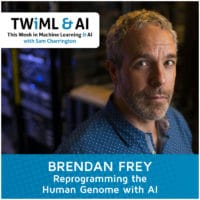Recently, the fine folks at Technology Review released their annual list of “Breakthrough Technologies,” highlighting 10 areas of tech they see having a real impact on the world in the near future.
Well, we see your list, and we raise you one of our own! We took a closer look at the topics as they relate to ML and AI, since that’s kind of our thing. While we haven’t specifically touched each of their topics, we’ve definitely come close. Check out our list below.
-
Unhackable Internet.
TR posits that the next form of the internet could be based on quantum physics. This would enable “inherently secure communication,” with messages sent over said network being unhackable. While we cover quantum extensively below (#7), cybersecurity is inseparable from the subject at hand, and we’ve covered that a bit on the pod.
-
Hyper-Personalized Medicine.
TR has boiled this down to “genetic medicine tailored to a single patient.” Outside of patient-specific medicine, machine learning will affect several other medical use cases, including preventing genetic diseases before they ever occur. Check out these in-depth discussions spanning precision medicine, genomics, tools, and more.
-
Digital Money
This segment of the article focuses on the emergence of crypto- and other digital currencies as disrupters to global finance–a space that will eventually impact investments, trading, stock prices, etc. In the episodes below, we explore a few machine learning use cases around financial trading.
-
Anti-aging drugs
Slowing the aging process is touted as a potential solution to treat diseases such as cancer, heart disease, and dementia. Fortunately, the fountain of youth might not be the only way. In the interviews below, we explore the potential future of drug discovery.
-
AI-discovered molecules
While Tech Review highlighted AI-discovered molecules as a means of drug discovery, that’s not the only use case for these molecular revelations. In the conversations below, our guests describe how they’re using machine learning to identify a variety of new molecules and materials. Really interesting stuff.
-
Satellite mega-constellations
This one is a little tricky for us, and it seemed to be for TR as well. Due to the reduced cost of launching a satellite into orbit, we now have the ability to send multi-satellite networks into orbit, but does it come at the cost of astronomy research? If that turns out to be the case, then we’ll no longer be able to explore things like the mapping of dark matter and dark energy with machine learning, like we did in the interviews below.
-
Quantum supremacy
Uncrackable equations seem increasingly in reach with the emergence of usable quantum supercomputers. In the conversations below, we cover the gamut of all things quantum—What is it? How is it measured? What could/should we use it for? And of course, why we’re already doing quantum machine learning all wrong.
-
Tiny AI
This topic is the most accessible, as an estimated 3.2 billion people across the globe have tiny AI algorithms and chips already in their hands (smartphones). But the next step is disconnecting these devices from the cloud. With help from a few friends at chip manufacturer Qualcomm, amongst others, we explore just how those tiny AI devices are shrinking and eventually deployed in the conversations below.
-
Differential Privacy
Differential privacy is an increasingly important topic, especially with the US government beginning to incorporate differential privacy into the way 2020 Census results are reported. TR defines differential privacy as “a mathematical technique that … measures how much privacy increases when noise is added” to personal data. We talk a bunch about differential privacy on the pod, mostly due to the overwhelming importance of privacy in the transfer of said data. There is a bunch of compelling content in this list, and our interview with Aaron Roth is a great place to start if you’re unfamiliar with the topic.
-
Climate change attribution
Climate change is the existential crisis of our time, and with ever-improving tools, we’re able to get a better idea about what impact these changes are having on our weather, and how to prepare. In the conversations below, we explore some of the projects and research dedicated to not only tracking the impact of the damage being done, but also exploring solutions.



































